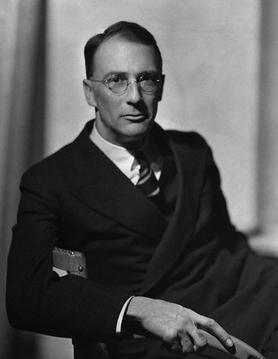
Cecil Louis Troughton Smith, known by his pen name Cecil Scott "C. S." Forester, was an English novelist known for writing tales of naval warfare, such as the 12-book Horatio Hornblower series depicting a Royal Navy officer during the Napoleonic Wars.
Horatio Hornblower is a fictional officer in the British Royal Navy during the Napoleonic Wars, the protagonist of a series of novels and stories by C. S. Forester. He later became the subject of films and radio and television programmes, and C. Northcote Parkinson elaborated a "biography" of him, The True Story of Horatio Hornblower.

Hornblower is a series of British historical fiction war television films based on three of C. S. Forester's ten novels about the fictional character Horatio Hornblower, a Royal Navy officer during the French Revolutionary and Napoleonic Wars.

Captain Horatio Hornblower is a 1951 British naval swashbuckling war film in Technicolor from Warner Bros., produced by Gerry Mitchell, directed by Raoul Walsh, that stars Gregory Peck, Virginia Mayo, Robert Beatty and Terence Morgan.

Sir James Lucas Yeo,, was a British naval commander who served in the War of 1812. Born in Southampton, he joined the Royal Navy at the age of 10 and saw his first action in the Adriatic Sea. He distinguished himself in combat multiple times, most notably during the Portuguese conquest of French Guiana, earning knighthoods in the Portuguese Order of Aviz and the British Order of the Bath. He was given command of the frigate Southampton, in 1812, but his ship was wrecked in the Bahamas although he was acquitted of blame for its loss. Yeo was then given command of the squadron on Lake Ontario and commanded it during several engagements with the Americans.

Mr. Midshipman Hornblower is a 1950 Horatio Hornblower novel written by C. S. Forester. Although it may be considered as the first episode in the Hornblower saga, it was written as a prequel; the first Hornblower novel, The Happy Return, was published in 1937.
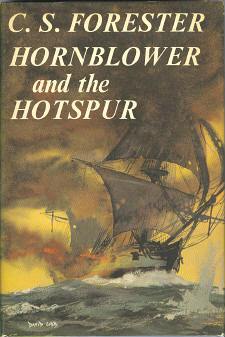
Hornblower and the Hotspur is a Horatio Hornblower novel written by C. S. Forester.
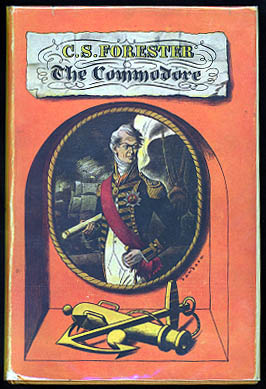
The Commodore is a Horatio Hornblower novel written by C. S. Forester. It was published in the United States under the title Commodore Hornblower.
HMS Renown was a 74-gun third-rate ship of the line of the Royal Navy. She was to have been named HMS Royal Oak, but the name was changed to Renown on 15 February 1796. She was launched at Deptford Wharf on 2 May 1798 and served in 1800-1801 as the flagship of Sir John Borlase Warren, initially in the English Channel.
The Examination for Lieutenant is an episode of the British television series Hornblower. It is loosely based on part of the 1950 novel Mr. Midshipman Hornblower by C. S. Forester. It was released on DVD in the United States under the title The Fire Ship.
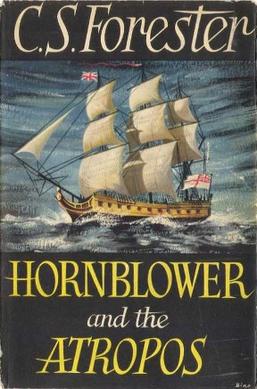
Hornblower and the Atropos is a 1953 historical novel by C.S. Forester.
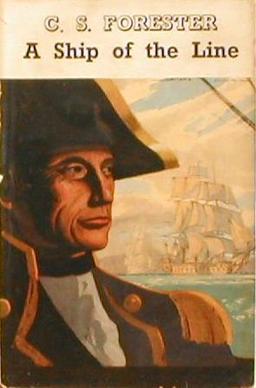
A Ship of the Line is an historical seafaring novel by C. S. Forester. It follows his fictional hero Horatio Hornblower during his tour as captain of a ship of the line. By internal chronology, A Ship of the Line, which follows The Happy Return, is the seventh book in the series. However, the book, published in 1938, was the second Hornblower novel completed by Forester. It is one of three Hornblower novels adapted into the 1951 British-American film Captain Horatio Hornblower R.N..

Flying Colours is a Horatio Hornblower novel by C. S. Forester, originally published 1938 as the third in the series, but now eighth by internal chronology. It describes the adventures of Hornblower and his companions escaping from imprisonment in Napoleonic France and returning to England. It is one of three Hornblower novels adapted into the 1951 British-American film Captain Horatio Hornblower R.N..
"Hornblower and the Widow McCool" is a short story by C. S. Forester featuring his fictional naval hero Horatio Hornblower. It was first published in the 9 December 1950 issue of The Saturday Evening Post as "Hornblower's Temptation" and then in the UK in the April 1951 Argosy as "Hornblower and the Big Decision." It was published as "Hornblower and the Widow McCool" along with the unfinished novel Hornblower and the Crisis and the short story "The Last Encounter" in 1967, after Forester's death. The story is set after Mr. Midshipman Hornblower and before Lieutenant Hornblower.
Alan Lewrie is the fictional hero and main character of Dewey Lambdin's naval adventure series of novels set during the American and the French Revolutions and the Napoleonic Wars. The series spanned some twenty-five novels with a 26th reportedly in progress at the time of Mr. Lambdin's death in July 2021.
Mutiny is the fifth episode of the British film series Hornblower. It was released on April 8, 2001. It is based on the 1952 book Lieutenant Hornblower by C.S. Forester. Mutiny was written by T. R. Bowen and directed by Andrew Grieve.
Retribution is the sixth episode of the British film series Hornblower. It was released on 15 April 2001, the week after the fifth episode, Mutiny, of which it is a continuation. It is based on the 1952 book Lieutenant Hornblower by C.S. Forester.
Loyalty is the seventh film of the British TV film series Hornblower, based on the books by C. S. Forester, particularly Hornblower and the Hotspur. It was released on 5 January 2003, nearly four years after the first four films and nine months after the next two films.
Duty is the eighth and final episode of the British TV series Hornblower, based on the 1962 book Hornblower and the Hotspur by C.S. Forester. It was released on 6 January 2003, a day after episode 7: Loyalty.
The Hand of Destiny is a short story C.S. Forester wrote about his most popular character, Horatio Hornblower, written in 1940, and published in Collier's magazine. Sanford Sternlicht, author of C. S. Forester and the Hornblower Saga, notes the story has multiple inconsistencies with later stories. He also notes elements of the story that Forester re-used in later stories.










